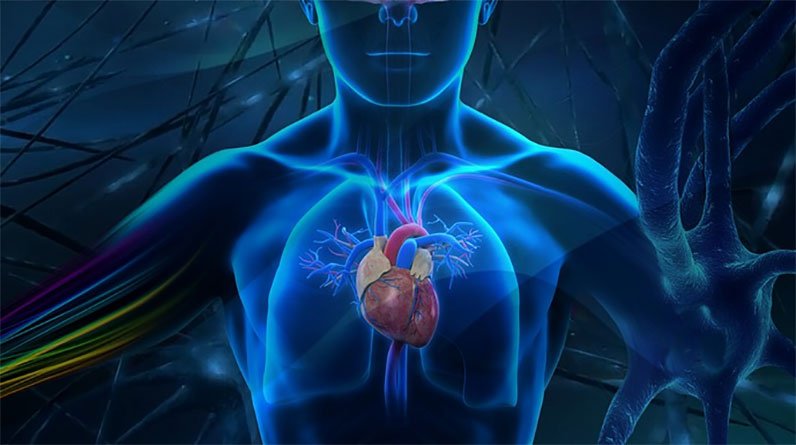
Thyroid Function and Other Organs
Part of the endocrine system, the thyroid is primarily responsible for producing, releasing, and controlling certain hormones that have direct effects on the body. These thyroid hormones include thyroxine and triiodothyronine.
When the levels of these hormones are altered, it has a direct effect (and some indirect effects) on nearly every organ in the body, including the two most important organs – the brain and the heart.
These effects lead to certain symptoms involving those other organ systems, such as cognitive impairments, GI complications such as constipation, musculoskeletal issues, and heart effects such as irregular rhythms.
In what follows, we’ll discuss how thyroid function affects the functions of other organs in the body. We will focus a little more specifically on the effects on the brain and heart.
Effects of Low Thyroid Function
Low thyroid function can have a significant impact on multiple organs and systems throughout the body.
When the thyroid gland does not produce enough hormones, it can produce some specific effects on the brain and heart.
Effects on the Brain
Low thyroid hormone levels cause impairment of cognition. There appears to be a direct relationship between the level of thyroid hormone and cognitive brain function, although the exact mechanism does not appear to be well understood. Such impairment can lead to many issues, including difficulty concentrating, memory problems, and a decrease in overall brain function, particularly as we age. Low thyroid function can also cause mood swings, depressive symptoms, and anxiety attacks.
• Cognitive Function
People with hypothyroidism may also experience a decreased ability to process and recall information, making learning new things more difficult. Additionally, some studies have shown that low thyroid function may increase the risk of developing neurodegenerative diseases such as Alzheimer’s and dementia.
• Mood Swings
The thyroid hormones also play a role in regulating mood and emotions. Low levels of thyroid hormones can cause mood swings, depression, anxiety, and irritability. This can make it difficult for people with hypothyroidism to manage stress, interact with others, and maintain positive relationships. In severe cases, low thyroid function can lead to severe depression.
Effects on the Heart
In addition to its effects on the brain, low thyroid function can also have an impact on the heart. The direct impact on the heart by hypothyroidism is decreased heart rate. Hypothyroidism can also have an indirect effect on the heart by causing high cholesterol.
• Decreased Heart Rate (Direct Effect)
Thyroid hormones help regulate heart rate, so a decrease in thyroid hormones can result in a slower heart rate, also known as bradycardia. This decrease in heart rate can result in feelings of fatigue, weakness, and lightheadedness.
People with low heart rates may also experience shortness of breath and palpitations, which can be distressing. In severe cases, bradycardia can increase the risk of heart failure, particularly in older adults or people with pre-existing heart conditions.
• Increased Risk Of Heart Disease (Indirect Effect)
Thyroid hormones also play a role in regulating cholesterol levels in the blood. Low thyroid hormone levels can result in elevated cholesterol levels, which can increase the risk of heart disease.
Effects of Overactive Thyroid Function
Hyperthyroidism, in which the thyroid gland produces too much thyroid hormone, can cause some specific effects on the organs in the body.
The following is a discussion of the effects of high thyroid function, particularly as it relates to the brain and heart.
Effects on the Brain
Hyperthyroidism can cause anxiety issues due to the overstimulation of the brain and nervous system by high levels of thyroid hormones. People with hyperthyroidism may experience feelings of nervousness, worry, and fear that are disproportionate to the situation. These conditions can often lead to panic attacks, which are characterized by sudden, intense episodes of fear accompanied by physical symptoms such as sweating, rapid heart rate, and shortness of breath. All of these issues can interfere with daily activities, work, and personal relationships.
Effects on the Heart
Hyperthyroidism can cause increased activity in the heart muscles, which leads to an increased heart rate. This increased heart rate can cause feelings of palpitations, shortness of breath, and chest pain.
Hyperthyroidism can also lead to an enlarged heart, which can increase the risk of high blood pressure and congestive heart failure. The increased workload on the heart due to increased heart rate and contractile force can cause it to enlarge, making it harder for the heart to pump blood effectively.
All of these effects can lead to high blood pressure, which increases the risk of heart disease, stroke, and other health problems.
Final Thoughts
Whether you are dealing with low thyroid function (hypothyroidism) or high thyroid function (hyperthyroidism), the effects on your other body organs can be significant.
Regular check-ups with your healthcare provider are the best way to monitor thyroid function effectively through blood testing. Maintaining good thyroid function can help to maintain good brain and heart function.



